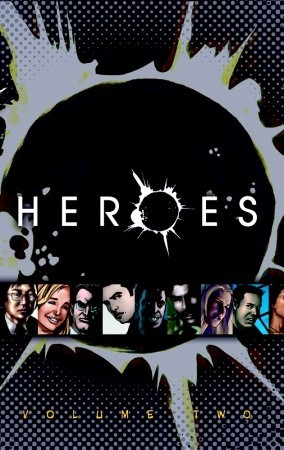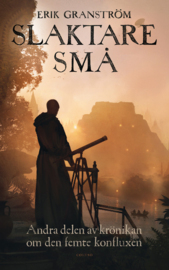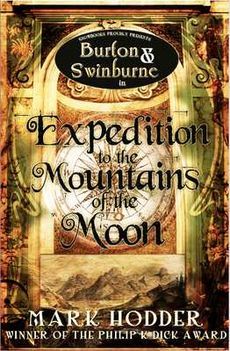 2. Agnes Cecilia - en sällsam historia, by Maria Grape. I used to watch the TV show based on this book all the time when I was younger. I loved it because of its creepiness. But for some reason or other I always missed the ending of the show. When I found this book with its pretty cover I decided to buy it in an instant. I couldn't put the book down. It was obvious that it was a teen book, and several times I thought the main character was acting childish (well, she's 14 so what did I expect?). I loved the whole detective part of the book, where Nora tries to find out who she is and where she comes from. To begin with the supernatural element was enticing too, but after a while it became more of an after-thought than something that actually mattered to the story. I'm not at all a fan of the ending. It felt like it came about too abruptly, although everything in the story had been resolved the ending still felt too sudden. I don't know why. All in all, I liked the book.
2. Agnes Cecilia - en sällsam historia, by Maria Grape. I used to watch the TV show based on this book all the time when I was younger. I loved it because of its creepiness. But for some reason or other I always missed the ending of the show. When I found this book with its pretty cover I decided to buy it in an instant. I couldn't put the book down. It was obvious that it was a teen book, and several times I thought the main character was acting childish (well, she's 14 so what did I expect?). I loved the whole detective part of the book, where Nora tries to find out who she is and where she comes from. To begin with the supernatural element was enticing too, but after a while it became more of an after-thought than something that actually mattered to the story. I'm not at all a fan of the ending. It felt like it came about too abruptly, although everything in the story had been resolved the ending still felt too sudden. I don't know why. All in all, I liked the book.3. The Fault in Our Stars, by John Green. I bought this book because everyone was talking about it. I was hoping I'd like it, but I didn't expect to. I've never been a fan of the romantic aspects in books. I don't like most romance movies or novels. The romance element destroyed Divergent for me for example. I had a period when I was 12 when I read Harlequin books, but that was more because I was curious about the sex, rather than interested in the romance. Knowing that TFIOS is a romantic story between two sick teens, I expected it to be sentimental and melancholic and that I wouldn't like it at all. I was wrong. I started reading it and couldn't stop. The darkness of their situation and the morbid humour was enough for me to like it. It wasn't sentimental. These were two teens fed up with being in broken bodies and angry at the world for making them sick and dying, and then finding some respite from their situation in each other. It wasn't what I expected. It was a lot better. And I cried so much.
 4. Heroes, vol. 2, by Joe Kelly. These two volumes basically just collect the webcomics that were published during the show's run. These comics show the background to a lot of side characters that you don't get to know much about in the show. For example I really enjoyed getting to know Candice (mostly because I can relate to her), and then of course learning how Ando and Kimiko came around to dating. I was kind of sad to learn that the rest of the comics weren't released as further volumes. Apparantly vol. 3 was set to be released in 2010 but for some reason it was cancelled :/ All the comics are still available online, though, so I may read the rest at some point.
4. Heroes, vol. 2, by Joe Kelly. These two volumes basically just collect the webcomics that were published during the show's run. These comics show the background to a lot of side characters that you don't get to know much about in the show. For example I really enjoyed getting to know Candice (mostly because I can relate to her), and then of course learning how Ando and Kimiko came around to dating. I was kind of sad to learn that the rest of the comics weren't released as further volumes. Apparantly vol. 3 was set to be released in 2010 but for some reason it was cancelled :/ All the comics are still available online, though, so I may read the rest at some point.5. Burton & Swinburne in Expedition to the Mountains of the Moon, by Mark Hodder. The third book in a steampunk series. What I really like about this series is that the main character knows that steampunk isn't what's supposed to happen. What Hodder has done is that he's taken real-life Victorian people and put them into a novel. There is a psychic who can see the future, but she can only see the future that was supposed to happen, rather than the one they're faced with now. It all comes back to what happened in the first book - how a man from the future travelled back and accidentally changed the course of history. In this book Burton is somehow transferred to the future, 1914, and sees the Great War. But it's not the Great War as we know it, and because of the changed history time becomes fuddled and pressed together and after a while the Great War includes elements from WW2 as well... We follow Burton twice over in this book. First as he wakes up as an amnesiac in 1914 after having travelled through time. And also as he goes out on an expedition through Africa to retrieve a mystical black diamond for the British prime minister. In the last third of the book we learn how he came to 1914 and at the same time he manages to return to 1863 from there. He then decides to fix history to the one he knows it's supposed to be, by travelling back 20 years and dealing with the man from the future. And then there's a major revelation and a major cliffhanger. I didn't like this book as much as the other two. I hope he fixes things in the next book, because honestly the amount of death in this book made me sad.



No comments:
Post a Comment
What's the first thought in your head after reading this? Let me know!